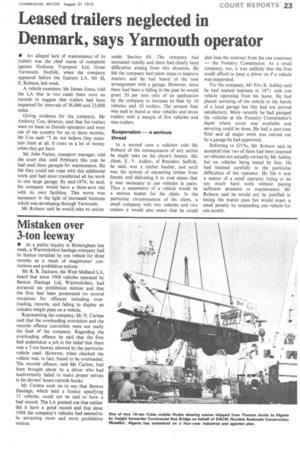Leased trailers neglected in Denmark, says Yarmouth operator
Page 25

If you've noticed an error in this article please click here to report it so we can fix it.
• An alleged lack of maintenance of its trailers was the chief cause of complaint against Hudsons Transport Ltd, Great Yarmouth, Norfolk, when the company appeared before the Eastern LA, Mr H, E. Robson, last week.
A vehicle examiner, Mr James Jones, told the LA that in two cases there were no records to suggest that trailers had been inspected for intervals of 36,000 and 23,000 miles.
Giving evidence for the company, Mr Anthony Coe, director, said that his trailers were on lease to Danish operators and were out of the country for up to three months. Mr Coe said: "I do not believe they maintain them at all. It costs us a lot of money when they get back.
Mr John Parker, transport manager, told the court that until February this year he had used three garages for maintenance. He felt they could not cope with this additional work and had since transferred all his work to one large garage. By mid-1974, he said, his company would have a three-acre site with its own facilities. This move was necessary in the light of increased business which was developing through Yarmouth.
Mr Robson said he would take no action under Section 69. The company had increased rapidly and there had clearly been difficulties arising from this situation. He felt the company had taken steps to improve matters and he had heard of the new arrangement with a garage. However, since there had been a failing in the past he would grant 50 per cent only of an application by the company to increase its fleet by 10 vehicles and 10 trailers. The present fleet was said to stand at nine vehicles and seven trailers with a margin of five vehicles and nine trailers.
Suspension — a serious threat In a second case a solicitor told Mr Robson of the consequences of any action he might take on his client's licence. His client, E. V. Ashley, of Brandon, Suffolk, he said, was a timber haulier, and such was the system of extracting timber from forests and delivering it to coal mines that it was necessary to use vehicles in pairs. Thus a suspension of a vehicle would be a serious matter for his client. In the particular circumstances of his client, a small company with two vehicles and two trailers it would also mean that he could also lose the contract from his one customer — the Forestry Commission. As a small company, too, it was unlikely that the firm could afford to keep a driver on if a vehicle was suspended.
For the company, Mr Eric B. Ashley said he had started business in 1971 with one vehicle operating from his home. He had placed servicing of the vehicle in the hands of a local garage but this had not proved satisfactory. More recent1S, he had garaged the vehicles at the Forestry Commission's depot where cover was available and servicing could be done. He had a part-time fitter and all major work was carried out by a garage he had appointed.
Referring to GV9s, Mr Robson said he accepted that two of them had been imposed on vehicles not actually owned by Mr Ashley but on vehicles being tested by him. He had listened carefully to the particular difficulties of the operator. He felt it was a matter of a small operator trying to do too much hard work without paying sufficient attention to maintenance. Mr Robson said he would not be justified in letting the matter pass but would exact a small penalty by suspending one vehicle for one month.












































































































